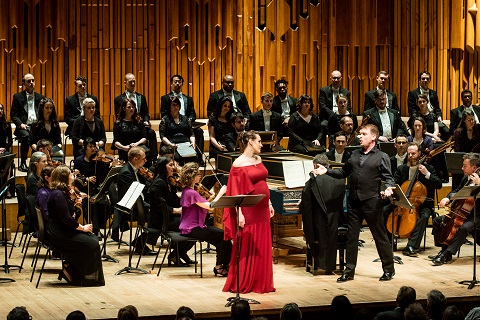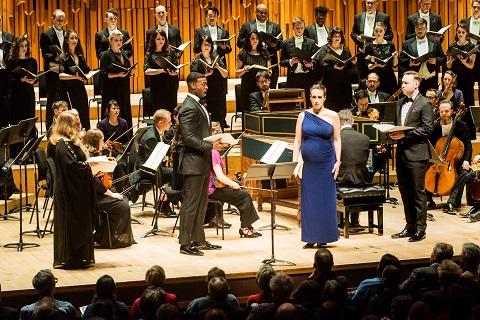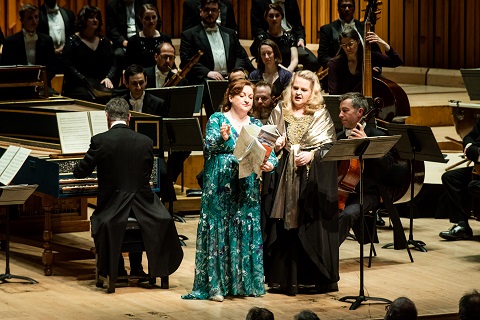
06 Apr 2019
A superb Semele from the English Concert at the Barbican Hall
It’s good to aim high … but be careful what you wish for. Clichéd idioms perhaps, but also wise words which Semele would have been wise to heed.
English Touring Opera are delighted to announce a season of lyric monodramas to tour nationally from October to December. The season features music for solo singer and piano by Argento, Britten, Tippett and Shostakovich with a bold and inventive approach to making opera during social distancing.
This tenth of ten Live from London concerts was in fact a recorded live performance from California. It was no less enjoyable for that, and it was also uplifting to learn that this wasn’t in fact the ‘last’ LfL event that we will be able to enjoy, courtesy of VOCES8 and their fellow vocal ensembles (more below …).
Ever since Wigmore Hall announced their superb series of autumn concerts, all streamed live and available free of charge, I’d been looking forward to this song recital by Ian Bostridge and Imogen Cooper.
The Sixteen continues its exploration of Henry Purcell’s Welcome Songs for Charles II. As with Robert King’s pioneering Purcell series begun over thirty years ago for Hyperion, Harry Christophers is recording two Welcome Songs per disc.
Although Stile Antico’s programme article for their Live from London recital introduced their selection from the many treasures of the English Renaissance in the context of the theological debates and upheavals of the Tudor and Elizabethan years, their performance was more evocative of private chamber music than of public liturgy.
In February this year, Albanian soprano Ermonela Jaho made a highly lauded debut recital at Wigmore Hall - a concert which both celebrated Opera Rara’s 50th anniversary and honoured the career of the Italian soprano Rosina Storchio (1872-1945), the star of verismo who created the title roles in Leoncavallo’s La bohème and Zazà, Mascagni’s Lodoletta and Puccini’s Madama Butterfly.
Evidently, face masks don’t stifle appreciative “Bravo!”s. And, reducing audience numbers doesn’t lower the volume of such acclamations. For, the audience at Wigmore Hall gave soprano Elizabeth Llewellyn and pianist Simon Lepper a greatly deserved warm reception and hearty response following this lunchtime recital of late-Romantic song.
Collapsology. Or, perhaps we should use the French word ‘Collapsologie’ because this is a transdisciplinary idea pretty much advocated by a series of French theorists - and apparently, mostly French theorists. It in essence focuses on the imminent collapse of modern society and all its layers - a series of escalating crises on a global scale: environmental, economic, geopolitical, governmental; the list is extensive.
For this week’s Live from London vocal recital we moved from the home of VOCES8, St Anne and St Agnes in the City of London, to Kings Place, where The Sixteen - who have been associate artists at the venue for some time - presented a programme of music and words bound together by the theme of ‘reflection’.
'Such is your divine Disposation that both you excellently understand, and royally entertaine the Exercise of Musicke.’
Amongst an avalanche of new Mahler recordings appearing at the moment (Das Lied von der Erde seems to be the most favoured, with three) this 1991 Mahler Second from the 2nd Kassel MahlerFest is one of the more interesting releases.
‘And there was war in heaven: Michael and his angels fought against the dragon; and the dragon fought and his angels, And prevailed not; neither was their place found any more in heaven … that old serpent … Satan, which deceiveth the whole world: he was cast out into the earth, and his angels were cast out with him.’
If there is one myth, it seems believed by some people today, that probably needs shattering it is that post-war recordings or performances of Wagner operas were always of exceptional quality. This 1949 Hamburg Tristan und Isolde is one of those recordings - though quite who is to blame for its many problems takes quite some unearthing.
There was never any doubt that the fifth of the twelve Met Stars Live in Concert broadcasts was going to be a palpably intense and vivid event, as well as a musically stunning and theatrically enervating experience.
‘Love’ was the theme for this Live from London performance by Apollo5. Given the complexity and diversity of that human emotion, and Apollo5’s reputation for versatility and diverse repertoire, ranging from Renaissance choral music to jazz, from contemporary classical works to popular song, it was no surprise that their programme spanned 500 years and several musical styles.
The Academy of St Martin in the Fields have titled their autumn series of eight concerts - which are taking place at 5pm and 7.30pm on two Saturdays each month at their home venue in Trafalgar Square, and being filmed for streaming the following Thursday - ‘re:connect’.
The London Symphony Orchestra opened their Autumn 2020 season with a homage to Oliver Knussen, who died at the age of 66 in July 2018. The programme traced a national musical lineage through the twentieth century, from Britten to Knussen, on to Mark-Anthony Turnage, and entwining the LSO and Rattle too.
With the Live from London digital vocal festival entering the second half of the series, the festival’s host, VOCES8, returned to their home at St Annes and St Agnes in the City of London to present a sequence of ‘Choral Dances’ - vocal music inspired by dance, embracing diverse genres from the Renaissance madrigal to swing jazz.
Just a few unison string wriggles from the opening of Mozart’s overture to Le nozze di Figaro are enough to make any opera-lover perch on the edge of their seat, in excited anticipation of the drama in music to come, so there could be no other curtain-raiser for this Gala Concert at the Royal Opera House, the latest instalment from ‘their House’ to ‘our houses’.
"Before the ending of the day, creator of all things, we pray that, with your accustomed mercy, you may watch over us."

It’s good to aim high … but be careful what you wish for. Clichéd idioms perhaps, but also wise words which Semele would have been wise to heed.
Enamoured of Jupiter, she craves to transcend her home among mere mortal and forge new heavenly alliances. Held back by practicalities, she refuses to compromise, preferring to push those close to her to the brink. When her wish is finally granted, the result is apocalyptic: she is consumed by thunderbolts, brusquely despatched to a galactic hinterland, and instantly regrets her own self-serving naivety and foolishness.
This tale of leaving, loving and losing may sound all too familiar, given the current political context. Certainly, William Congreve’s libretto - which was originally intended for a production which never took place, in the Queen’s Theatre some forty years previously, with music by John Eccles - reflected contemporary political anxieties, not least in its portrayal of a failed royal marriage. By the time an anonymous author adapted Congreve’s text for Handel’s 1743 Semele the political context had changed, but the rival London theatres were engaged in a political cut-and-thrust of their own, and Handel had already begun to look to the English oratorio as a form that might save his own financial bacon.
Semele was originally heard in a concert performance at Covent Garden in February 1744, presented ‘after the manner of an oratorio’. But, that didn’t fool anyone: Charles Jennens, librettist of Messiah among other Handel oratorios described Semele as a ‘bawdy opera’ while John Mainwaring, Handel’s first biographer, wrote in 1760 that ‘Semele is an English opera but called an oratorio, and performed as such’.
Concert, semi-staged, staged … none of these terms seem apt for this performance by The English Concert under their director Harry Bicket at the Barbican Hall. It was quite a simply an evening of delightfully and unwaveringly engaging theatre and a terrific musical treat. Un-costumed, and with gesture and movement left to the singers’ discretion, its dramatic impact derived solely from what we heard - from the superb team of soloists, instrumentalists and chorus - and from the manner of delivery as guided by Bicket and entrusted to the soloists’ own persuasive instincts, with several of the cast singing from memory and others almost entirely off-score.
And what a team of soloists it was: a genuine cross-Atlantic collaboration, with three singers hailing from the US and three from the UK. It was also satisfying to be given a chance to hear again singers who have recently impressed, as well as to hear new voices for the first time. The title role was taken by Brenda Rae whose Wigmore Hall debut at the end of 2018 made a striking impact. Recently, at the Royal Academy , Olivia Fuchs fashioned Semele into a celebrity YouTuber, worshipped by a crowd of social media obsessives; and, the theme of the 2019 London Handel Festival is Handel’s Divas. But, Rae’s Semele was no egotistical prima donna, strutting, stomping and sulking until she got her own way. Indeed, in Act 1 Rae was surprising restrained, holding back her silvery soprano and slightly concealing its shine, though even at its most tender and restrained Rae’s vocal line floated above or through the accompaniment with focus and presence. The first sign of mischief came with the act-ending ‘Endless Pleasures, endless love), Rae’s eye’s glinting with a hint of the vocal sparkle that would later erupt.
 Elizabeth DeShong (Juno/Ino), Soloman Howard (Somnus/Cadmus), Brenda Rae (Semele), Christopher Lowrey (Athamas). Photo credit: Robert Workman.
Elizabeth DeShong (Juno/Ino), Soloman Howard (Somnus/Cadmus), Brenda Rae (Semele), Christopher Lowrey (Athamas). Photo credit: Robert Workman.
This was a gentler Semele than we are sometimes presented with, and Rae’s affecting shapeliness of phrase in Semele’s Act 2 arias, ‘O sleep, why does thou leave me?’ and ‘With fond desiring’, made her dilemma and doubts more poignant than is sometimes the case. In Act 3, though, urged on by Juno, Semele’s solipsism erupted in a glistening display of self-love: ‘Myself I shall adore’ was a glory of rib-tickling coyness, and now the strength of Rae’s soprano was unleashed, the jewel-like spark lit. The coloratura was so smooth and clean it seemed almost too easy. And, luminosity marked Semele’s repentance of her destructive ambition, suggesting less regret than acceptance.
Two recent appearances in the role of Butterfly’s maid, Suzuki, by mezzo-soprano Elizabeth DeShong - at the ROH in 2017 and at Glyndebourne last year - whetted the appetite for her doubling up here as Ino/Juno, and we were not disappointed. Despite a spangly silver shawl, it wasn’t always clear where Ino ended and Juno began, but that was of no import. Like Handel’s genre, DeShong’s voice seems to elude definition: soprano, mezzo, contralto, it encompasses and assimilates elements of them all. The top notes tingled, and the lower inky expanses mesmerised. What wonderful layers and textures, too: plummy, honeyed, smoky, gleaming. DeShong’s range seems limitless, rising and falling, and it’s a voice that feels free but is meticulously focused. The legato phrases of ‘Turn hopeless lover’, in which Ino first expresses her unrequited love, were exquisitely sculpted but replete with burning, repressed passion. The self-congratulatory extravagances of Ino’s moment of self-determination, ‘Hence, Iris, hence away’, were bulls-eye-precise and lyrically appealing - no hint of hootiness, though vigorously accented.
 Ailish Tynan (Iris) and Elizabeth DeShong (Ino). Photo credit: Robert Workman.
Ailish Tynan (Iris) and Elizabeth DeShong (Ino). Photo credit: Robert Workman.
Benjamin Hulett was a dashing and, paradoxically, very ‘human’ Jupiter, evincing real flesh-and-blood ardency and compassion. In Act 2 Jupiter has three very different arias in close succession and Hulett was master of them all. The long, long line he crafted in ‘Lay your doubts and fears aside’ attested to both courage and an excellent breathing technique, while ‘I must with speed amuse her’ was agile and accurate. ‘Where’er you walk’ resonated with genuine feeling. If some of Hulett’s ornamentations of the da capo repeats were elegant but decorative rather than expressive then who could complain.
I have not heard American bass Soloman Howard before, but I’d very much like to hear him again soon. His Cadmus, King of Thebes, was authoritative but truly melodious - a quite spiritual and reverential father, rather than a bullying patriarch. Howard expressed Somnus’s sleepy displeasure, in ‘Leave me, loathsome light’, in a wearily distanced tone and, at the mention of the nymph Pasithea, his sudden perky transformation into agile virility in the ensuing ‘More sweet is that name’ was classic comic understatement.
Ailish Tynan’s Iris was a fizzing bundle of fun-loving pragmatism; she had no time for Ino’s moping, resourcefully supplying her with a road-map of the planetary spheres, and when her practical efforts were spurned, kicking the map aside and tormenting her mistress with an Okay magazine centrefold of the soon-to-be-weds, then flouncing off to indulge in the gossip. Iris’s report that Jove has installed Semele in a palace atop a mountain, ‘There, from mortal cares retiring’, shone brightly and gave Tynan the opportunity to display her terrific trill.
Christopher Lowrey was an agile-voiced Athamas, and his countertenor carried easily with no hint of strain. The roles of the Priest (Act 1) and Apollo (Act 3) were taken confidently by Joseph Beutel and Brian Giebler respectively, members of the fabulous Clarion Choir whose intonation and diction were immaculate and who showed they could sing a fugue with light vigour as readily as they could conjure an expressive expanse of sustained and sensitive sound. There was so much drama, too, in the playing of the English Concert. Nadja Zwiener worked tirelessly and, paradoxically, her labours resulted in a wonderful lightness: the violins’ bows were tremendously buoyant, almost breathlessly so. Some might have found the string textures too ‘short and spiky’, but warmth derived from the full complement of players - even if the woodwind did not always manage to come to the fore - and Joseph Crouch’s cello obbligatos were highlights of a stellar evening.
With the London Handel Festival in full swing and the ROH’s Berenice playing in the Linbury there are no shortage of Handelian treats currently available in London at this time. But, this Semele was a special performance. And, Brenda Rae saved the best until last: as Jupiter appeared in god-like form, thus sealing her fate, “Ah me! Too late I now repent” was her own heavenly response. Self-adoring she may have been, but at that moment she was simply awe-inspiring and adorable.
Claire Seymour
Handel:
Semele
The English Concert/Harry Bicket (director, harpsichord)
Semele - Brenda Rae, Juno/Ino - Elizabeth DeShong, Somnus/Cadmus - Soloman Howard, Jupiter - Benjamin Hulett, Iris - Ailish Tynan, Athamas - Christopher Lowrey, Apollo - Brian Giebler, Priest - Joseph Beutel, Clarion Choir (Artistic Director - Steven Fox)
Barbican Hall, London; Friday 5th April 2019.